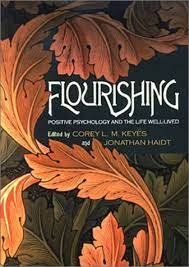Lecture 11:
What Does Lead to Happiness Part 1:
Gratitude and Generosity
“When you arise in the morning, give thanks for the morning light, for your life and strength. Give thanks for your food, and the joy of living. If you see no reason for giving thanks, the fault lies with yourself.”
-Tecumseh, Shawnee Chief
For the first step in gratitude: stop reading this sentence and take a look around you. Now, take one deep inhale in, and one long exhale out. Make note of each and every detail: your feelings, thoughts, and environment. Then answer this question - what are you grateful for at this very moment? No matter where you are, what you’ve experienced, or what you’re feeling, there is always something to be grateful for. Studies on well-being show if you practice gratitude for at least a few minutes a day, you can greatly improve your happiness. But in a culture that contaminates our minds with the message that we must put ourselves first - that we are entitled to a life of consumption and self-centeredness - it can be difficult to know what practicing gratitude and generosity (both material, mental, and spiritual) even looks like.
We may say grace before dinner or thank a worker for their service, but how often do we feel that gratitude deep in our bones? Long-term happiness cannot be cultivated through a simple “thank you” tacked on at the end of an engagement or when receiving a benefit to which you feel entitled. Instead, happiness is promoted by “Grateful Living” - as clarified by Brother David Steindl-Rast. Grateful Living is engaging with every moment as the opportunity to see with love, wholeness, openness, and connection - no matter your internal or external conditions. Grateful living asks how often you give gratitude wholeheartedly without expecting anything in return? Have you ever thanked a tree for its shade, a stranger for their smile, a flower for its beauty, a friend for their laughter, or an apple for its nourishment? Have you ever thanked what you did not want, for the sheer reflection that some things in life may hold a purpose towards your growth?
Gratitude is the power we have in transforming every moment to an opportunity for ourselves and others to develop and grow. If you’re currently feeling unhappy, question if you’re creating an unhappy world. Recognize what you give attention to throughout the day – are you focused on your fears and what you’re lacking or what you love and where you have abundance? Are you seeing life with a glass half empty or a glass half full? According to happiness expert Shawn Achor, gratitude makes this question irrelevant. Whether the glass is half empty or half full becomes not important if you have a pitcher full of gratitude to replenish yourself at anytime!
Lecture - Gratitude and Generosity.
Lecture on developing Gratitude and Generosity. This is labeled Lecture 5C for a short course, but is part of Lecture 11 here.
Learning Objectives:
Gratitude is the quality of being thankful; readiness to show appreciation for, and to return, kindness
Gratitude is thought to be one of the “moral” emotions
Ancient wisdom that developing a sense of gratitude is essential to happiness
Gratitude is often evoked by a personal gift of something valuable that’s needed
Every moment can be seen as a gift – an opportunity – to make something new and fresh
Gratitude activates the medial prefrontal cortex, and area associated with social interactions, empathetic behavior, and theory of mind
A sense of entitlement and expectation of reward inhibits feelings of gratitude
Putting Happiness into Practice:
Weekly Activity:
Savor the Moment!
During this week, your assignment is to spend time outdoors. Hike up Spencer Butte or Hendrick's Park (which is near campus). If you can’t do that, go for a walk where ever you are. Do it by yourself, or with friends/family, but however you do it, walk quietly, in silence, and savor the beauty around you. Our minds are always so busy, immersed in our human world, we don’t recognize the beauty around us. Make sure you spend at least one hour this week savoring, in silence, that natural beauty. Try and use the meditative skills you learned in a previous exercise to quiet your mind and be present during your walk. Write about your experience in your journal.
Read
Yale Daily News article, “The Opposite of Loneliness” - Marina Keegan
Free pdf academic article, “Spending Money On Others Promotes Happiness” - Elizabeth W. Dunn, Lara B. Aknin, and Michael L. Norton
Free pdf academic article, “The Funds, Friends , and Faith of Happy People” - David G. Myers
You can purchase Flourishing here and read “Doing Well By Doing Good” - Piliavan (2003)
-
BOOKS
Give and Take - Adam Grant — purchase here
The Choice - Dr Edith Eva Eger — purchase here
Living in Gratitude - Angeles Arrien — purchase here
The Forgiving Life - Robert D. Enright — purchase here
Rainy Brain, Sunny Brain - Elaine Fox — purchase here
The 7 Laws of Magical Thinking - Matthew Hutson — purchase here
SCHOLARLY PUBLICATIONS
“Neural correlates of gratitude” - Glenn R. Fox, et al.
“Positive affect and markers of inflammation” - Stellar, J. E., John-Henderson, N., Anderson, C. L., Gordon, A. M., McNeil, G. D., and Keltner, D.
“Gratitude Influences Sleep through the Mechanism of Pre-Sleep Cognitions” - Wood, A. M., et al.
“Measuring Gratitude in Youth” - Froh, J. J., et al.
“Gratitude and Well-Being” - Wood, A. M., et al.
POPULAR SOURCES
“The Opposite of Schadenfreude Is Freudenfreude. Here’s How to Cultivate It.” - NY Times
“How Kindness Fits into a Happy Life” - Greater Good
“Does Practicing Gratitude Help Your Immune System?” - Greater Good
“How Gratitude Can Help You Through Hard Times” - Greater Good
“How Gratitude Changes Your Brain” - Greater Good
“Why is Gratitude So Hard for Some People?” - Greater Good
Watch
-
“The Amazing Effects of Gratitude” - BrainCraft
“How Gratitude Rewires Your Brain” - Jim Kwik
“Why gratitude is good for you (seriously)” - Neuro Transmissions
“Power of Gratitude” - Psych2Go
“Kiss your brain: The science of gratitude” - Christina Costa
“An Antidote to Dissatisfaction” -
Kurzgesagt–In a Nutshell
“The Gratitude Experiment” - watchwellcast
“An Experiment in Gratitude” - Participant
“Empathy + Gratitude = Success” - David Meltzer
“How to Practice Gratitude” - The Holistic Psychologist
“How Gratitude Can Change Your Life” - Jay Shetty
Listen
-
“The Secrets of Happy People” - Oprah’s Super Soul
“The Soul of Money” - Oprah’s Super Soul
“What I Know For Sure: Connection and Gratitude” - Oprah’s Super Soul
“The Science Behind Gratitude” - Ten Percent Happier
“The Immense Power of Giving a Crap” - Ten Percent Happier
“How to be Grateful When Everything Sucks” - Ten Percent Happier
“How Gratitude Helps Your Brain” - Science of Happiness
“Brene Brown On: Gratitude, Vulnerability, and Courage” - Good Life Project



